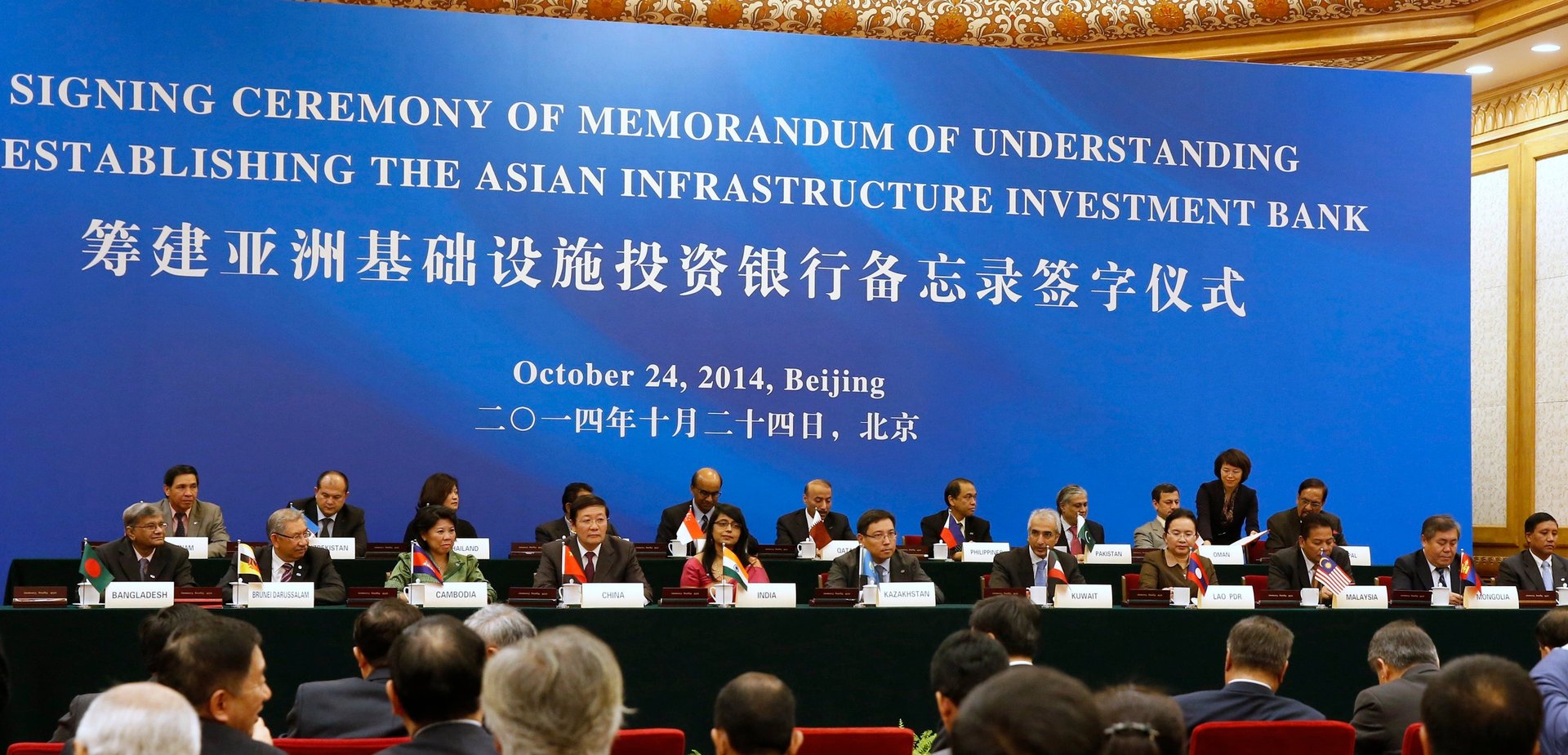Why human rights objections to China’s version of the World Bank ring false
US officials can’t be happy that France, Germany, and Italy are now joining the Asian Infrastructure Investment Bank (AIIB), China’s alternative to the World Bank. After the United Kingdom’s earlier, Mar. 12 announcement (paywall) that it would join the AIIB, one senior White House official complained in an interview with the Financial Times of a “trend toward constant accommodation of China.”


US officials can’t be happy that France, Germany, and Italy are now joining the Asian Infrastructure Investment Bank (AIIB), China’s alternative to the World Bank. After the United Kingdom’s earlier, Mar. 12 announcement (paywall) that it would join the AIIB, one senior White House official complained in an interview with the Financial Times of a “trend toward constant accommodation of China.”
China announced the establishment of the AIIB in Oct. 2013. A year later, 21 countries—including key US allies like India and the Philippines—signed on. Japan, Australia, and South Korea reportedly abstained under considerable pressure from officials in Washington. But many suspect the three are inching toward signature.
The US Treasury has criticized Beijing’s venture as an attempt to undermine both the World Bank and the Asian Development Bank, which are largely dominated by Western and Japanese interests. But others have made the issue about something more sympathetic.
According to The New York Times, “A senior Obama administration official said the Treasury Department had concluded that the new bank would fail to meet environmental standards, procurement requirements and other safeguards adopted by the World Bank and the Asian Development Bank, including protections intended to prevent the forced removal of vulnerable populations from their lands.”
These are certainly legitimate concerns, but the rival World Bank is hardly the world’s foremost champion for human rights in the developing world. According to Philip Alston, special rapporteur for the UN Human Rights Council, in a column for The Washington Post, this is because “the bank’s 1944 Articles of Agreement forbid it from considering political matters. Human rights are seen to be in a wholly different category from the supposedly antiseptically apolitical work of the bank.”
And although the World Bank has safe-guards in place to protect the vulnerable populations cited by White House officials, they appear to be more regularly neglected than enforced.
Just in Aug. 2014, Amnesty International publicly condemned a World Bank-funded project in Lagos, Nigeria, that—although designed to increase access to public services for some of the city’s poorest—ended up razing 266 homes and businesses, “without genuine consultation or adequate and reasonable notice and with no remedy for the loss suffered,” according to Audrey Gaughran, director of global issues at Amnesty International.
A 59-page report compiled by Human Rights Watch highlights similar trends at the World Bank. It points to one World Bank-sanctioned practice in Ethiopia known as “villagization,” which involves “forcibly relocating some 1.5 million indigenous and other marginalized people in five regions of Ethiopia to new villages where the government claimed there would be improved access to basic services and infrastructure.” The same report found “consultation and compensation have been grossly inadequate, and relocation marred by intimidation and violence, with state security forces repeatedly threatening, assaulting, and arbitrarily arresting villagers who resist transfer.”
Known as “development-induced displacement and resettlement,” or DIDR, it’s one of the most commonly overlooked, large scale human-rights violations carried out by governments against their own people. Now with World Bank complicity.
To be fair, the World Bank does recognize international human-rights goals, and has publicly declared the integrality of human rights to economic development. In 1998, it acknowledged that “creating the conditions for attainment of human rights is a central and irreducible goal of development” and that “the world now accepts that sustainable development is impossible without human rights.” But when the choice comes down to accruing capital for a growing market, or alienating an oppressive partner-regime, human rights have sometimes been the first to be thrown overboard.
So for US officials to frame their objections to the AIIB as a concern for human rights is disingenuous at best. At worst, it signals a troubling mentality, the very same feared present in the AIIB: that ethical development is more a playing chip in the pursuit of cash flow than a universally human interest.